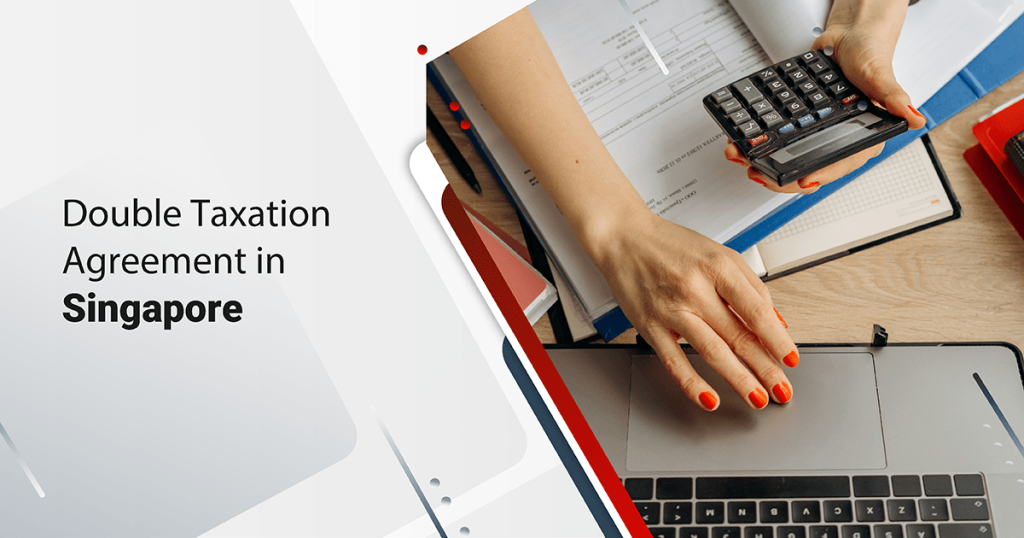Singapore’s tax framework is tailored to support and enhance international business activities by eliminating the risk of double taxation. Recognising that double taxation can deter cross-border trade and unfairly penalise companies, the country has proactively established Avoidance of Double Tax Agreements (DTAs). These agreements ensure that your business’s international income is not taxed twice, promoting a fair
corporate tax framework in Singapore.
Additionally, for countries where Singapore does not have a DTA, Unilateral Tax Credits (UTC) are available to tax resident entities, offering further protection against double taxation. In this article, we have discussed all the details of the Double Taxation Agreement Singapore including tax treaties, requirements, tax relief types, DTAs concluded by this country, and other relevant information.
What is a Double Taxation Agreement (DTA)?

A DTA is a bilateral contract between two countries designed to protect taxpayers from the burden of double taxation on income that flows between the two nations. By establishing clear guidelines on the taxation rights of each country over different types of income, a DTA ensures that both countries do not tax income earned across borders. This facilitates smoother international trade and investment and reduces tax obstacles for individuals and businesses.
Why is Double Taxation Required?
Double taxation occurs because countries have different tax rules:
- In Singapore, the tax system is based on territorial principles, meaning that only income earned within the country is taxed. In contrast, countries like Australia and the USA tax their residents on income earned locally and internationally.
- Nations also vary in defining the “source rules” of income. Some determine the source of revenue based on where it is generated, while others base it on where the income is received.
- The criteria for determining an individual’s or company’s tax residency can also differ. For example, if Country A qualifies a person as a resident after staying 100 days in a year, and Country B has the same rule, a person spending 100 days in both countries could be taxed by both, leading to double taxation of the same income in that year.
What is a Double Tax Agreement in Singapore?
A Double Taxation Agreement (DTA) in Singapore helps resolve problems caused by conflicting or unclear tax rules between Singapore and other countries by clarifying these rules. It specifies each country’s taxing rights and includes detailed provisions for tax credits, reliefs, or exemptions to prevent double taxation on income generated from economic activities.

Moreover, double taxation in Singapore can offer additional benefits, such as Tax Sparing Credits, which are designed to promote bilateral trade by allowing a lower net tax than would be imposed individually by the countries involved.
Furthermore, DTAs facilitate the exchange of tax-related information between countries, enabling them to accurately track income flows and enforce their respective tax laws.
Who Will Get Benefits From DTAs?
The Double Tax Agreements (DTAs) application is available only to residents. Under Section 2 of the Singapore Income Tax Act, a resident is defined as:
- An individual: A person who resides in Singapore during the year preceding the assessment year, allowing for reasonable temporary absences that do not contradict a claim to Singapore residency. This definition also includes anyone physically present or employed in Singapore (excluding company directors) for 183 days or more in the year before the year of assessment.
- A company or body of persons: This refers to a company or a group whose business control and management occur within Singapore.
If you earn foreign income from a country that has tax treaties with Singapore, you can claim tax relief by submitting a Certificate of Residence to that foreign country. This is proof of your Singapore tax residency.
Conversely, if you are a tax resident of a treaty country and not Singapore, you must provide the Inland Revenue Authority of Singapore (IRAS) with a Certificate of Residence from Non-Residents. This certificate, which must be certified by the tax authority of the treaty country, allows you to claim relief from Singapore Income Tax under the Avoidance of Double Taxation Agreement.
Income Types Typically Covered Under the DTA
The DTA covers the following types of income:
- Income from immovable property
- Business profits
- Income from shipping and air transport
- Income from associated enterprises
- Dividends paid
- Interest
- Fees and royalties paid for technical services
- Capital gains tax
- Income from independent personal services
- Income from dependent personal services
- Directors’ fees
- Income from artists and sports-persons
- Remuneration and pensions related to government service
- Pensions and annuities not related to government service
- Income for students and trainees
- Income for teachers and researchers
- Income derived by the government
Tax Relief Types in Double Taxation in Singapore
The type of tax relief offered under Double Tax Agreements (DTAs) varies from one treaty to another. Typically, the country where you reside will either credit you for taxes you’ve paid in another country or give you a
tax exemption from local taxes if you’ve already paid taxes on that income in the other country.

In Singapore, there are several specific methods of tax relief available:
- Total Exemption: If your income has already been taxed in another country, Singapore won’t include this income when calculating your taxes. This means it does not affect the tax rate applied to your other income.
- Exemption With Progression: Under this method, while Singapore doesn’t tax the income that was taxed elsewhere, it still considers this income when determining the tax rate for your remaining income.
- Ordinary Credit: Singapore will credit you with an amount equal to the tax it would charge on your foreign-taxed income. If the tax you paid abroad is higher, you won’t get a refund for the difference.
- Full Credit: Singapore allows you to credit the total amount of tax you paid abroad against your Singapore tax bill. If the foreign tax is higher, Singapore reduces its tax accordingly.
- Tax Sparing Credit: Singapore normally only gives a tax credit if the income has been taxed abroad. However, with a tax-sparing credit, Singapore will provide you with credit for the tax you would have paid in the other country, even if it had been waived. This can significantly reduce the effective tax rate below what either country typically charges.
Double Tax Treaties (DTAs) Concluded by Singapore
Singapore has established a comprehensive network of DTAs and similar tax agreements with many of the world’s major economies. These agreements can vary in type, and it is worth noting that this Southeast Asian country holds multiple types of agreements with some countries, such as the United Arab Emirates.
- Avoidance of Double Tax Agreement (DTA): These agreements prevent the double taxation of income arising from cross-border transactions between the two signing countries.
- Non-Ratified DTAs: These are DTAs that have been signed by the two countries involved but have yet to be ratified by their respective legislative bodies. Although not currently enforceable as law, they are expected to be implemented retroactively once ratified.
- Limited Treaties: These treaties are not as comprehensive as DTAs and typically focus on specific areas, such as income from shipping or air transport.
- Exchange of Information Arrangements (EOI Arrangements): These arrangements are solely for the exchange of tax-related information. Under these arrangements, treaty partners can request information from Singapore’s Comptroller of Income Tax. It is important to note that DTAs generally include provisions for EOI Arrangements.
- Permanent Establishment (PE): The concept of a PE is central to all DTAs. Whether a business entity is taxable in another country often hinges on the presence of a PE. This typically refers to a fixed place of business where activities are conducted and can include:
- A place of management
- A branch
- An office
- A factory
- A warehouse
- A workshop
- A farm or plantation
- A mine, oil well, quarry, or any other place of natural resource extraction
- A building site or a construction, installation, or assembly project
Furthermore, a person is considered to have a permanent establishment in Singapore if they:
- Conduct supervisory activities related to a building site or a construction, installation, or assembly project
- Engage another person in Singapore who acts on their behalf and either (a) has and routinely uses the authority to conclude contracts, (b) keeps a stock of goods or merchandise for delivery, or (c) regularly secures orders primarily for that person or other controlled enterprises.
Tax Relief in the Absence of DTA
Even without a DTA, a Singapore resident can still avoid double taxation on income from certain countries. The Singaporean tax system offers a tax exemption on various types of foreign income, such as dividends, income from foreign branches, and other foreign-sourced income. This exemption has been in effect since 1st June 2003 and is applicable when certain conditions are fulfilled. These conditions include:
- The foreign country from which the income originates must have a corporate tax rate of at least 15% when the income is received in Singapore.
- The foreign income must have been taxed in that country, regardless of whether the foreign tax paid is the same as their headline tax rate.
Singapore’s Unilateral Tax Credits (UTC)
It is available for Singapore tax residents when dealing with countries that do not have Double Tax Agreements (DTAs) with Singapore. UTC allows for a credit against Singapore tax for foreign taxes paid on certain types of foreign-sourced income from other countries, provided the income is brought into Singapore:
- Income from professional, consultancy, and other services rendered outside Singapore
- Royalties derived from outside Singapore, provided that the royalties are:
- Not borne by a person or entity resident in Singapore or by a permanent establishment in Singapore unless related to a business operated outside Singapore through a permanent establishment abroad; and
- Not deductible against any foreign-sourced income accruing in or derived from Singapore.
- Dividend income
- Employment income
- Branch profits
- Profits derived from an overseas branch of a Singapore resident company
From the Year of Assessment 2009, Singapore’s Unilateral Tax Credits are granted on all foreign income this country receives by tax residents without a DTA.
Withholding Tax in Singapore
A Double Tax Agreement is primarily utilised to ascertain if a reduction or exemption from tax on specific types of income can be achieved.
Typically, the following types of income are subject to withholding tax in Singapore:
| Nature of the Income |
Withholding Tax Rates |
| Interest, commission, fee, or other payment in connection with any loan or indebtedness |
15% |
| Royalty or other lump sum payments for use of moveable properties |
10% |
| Management fees |
Prevailing corporate tax rate @ 17% |
| Rent or other payments for the use of moveable properties |
15% |
| Technical assistance and service fees |
Prevailing corporate tax rate @ 17% |
| Proceeds from the sale of any real property by a non-resident property trader |
15% |
FAQs About Double Taxation Agreement in Singapore
- The Double Tax Agreement (DTAA) is a treaty between two countries designed to prevent the same income from being taxed twice in those countries. For example, the DTAA between Singapore and the United Kingdom (UK) was implemented in 1998 for income and corporate taxes and in 1999 for capital gains taxes.
- Singapore has entered into around 100 DTAs with various countries, including agreements with all 10 ASEAN member states.
- If you are a tax resident of a country having a DTA with Singapore, you may be safeguarded against being taxed twice on the same income in Singapore.
About the Author
Mabel Ng
With over two decades of experience in direct and indirect taxation, Mabel has honed her expertise across a broad spectrum of environments, including the Big 4 accounting firms, mid-tier firms, and various industry roles. Her extensive background spans not only Singapore but also the wider Asia-Pacific region, reflecting a deep understanding of diverse tax landscapes and practices. She is also a member of the ISCA and FCCA, and is an SCTP Accredited Tax Practitioner.
More on Business Blogs
 A DTA is a bilateral contract between two countries designed to protect taxpayers from the burden of double taxation on income that flows between the two nations. By establishing clear guidelines on the taxation rights of each country over different types of income, a DTA ensures that both countries do not tax income earned across borders. This facilitates smoother international trade and investment and reduces tax obstacles for individuals and businesses.
A DTA is a bilateral contract between two countries designed to protect taxpayers from the burden of double taxation on income that flows between the two nations. By establishing clear guidelines on the taxation rights of each country over different types of income, a DTA ensures that both countries do not tax income earned across borders. This facilitates smoother international trade and investment and reduces tax obstacles for individuals and businesses.
 Moreover, double taxation in Singapore can offer additional benefits, such as Tax Sparing Credits, which are designed to promote bilateral trade by allowing a lower net tax than would be imposed individually by the countries involved.
Furthermore, DTAs facilitate the exchange of tax-related information between countries, enabling them to accurately track income flows and enforce their respective tax laws.
Moreover, double taxation in Singapore can offer additional benefits, such as Tax Sparing Credits, which are designed to promote bilateral trade by allowing a lower net tax than would be imposed individually by the countries involved.
Furthermore, DTAs facilitate the exchange of tax-related information between countries, enabling them to accurately track income flows and enforce their respective tax laws.
 In Singapore, there are several specific methods of tax relief available:
In Singapore, there are several specific methods of tax relief available:


